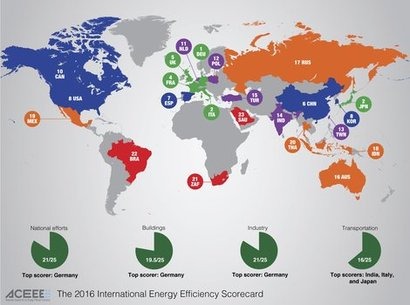
France and the UK occupy the fourth and fifth places on the table while the US has moved up one place behind Spain and China, to the eighth spot. New to the rankings this year are eight nations: Indonesia, Netherlands, Poland, Saudi Arabia, South Africa, Taiwan, Thailand, and Turkey.
Now in its third edition, the ACEEE report finds that the United States rose in the international rankings from thirteenth place in 2014 to eighth in 2016.
On a scale of 100 possible points in 35 categories, the nations were ranked by ACEEE as follows: Germany (1), Italy (2, tied), Japan (2, tied), France (4), UK (5), China (6), Spain (7), South Korea (8, tied), United States (8, tied), Canada (10), Netherlands (11), Poland (12), Taiwan (13), India (14), Turkey (15), Australia (16), Russia (17), Indonesia (18), Mexico (19), Thailand (20), South Africa (21), Brazil (22), Saudi Arabia (23). Together these countries represent 75 percent of all the energy consumed on the planet and over 80 percent of the world’s gross domestic product (GDP).
The US rank was boosted by high scores in a number of new metrics added to the report for 2016, as well as improvements in energy intensity, or energy use per dollar of GDP. The US also benefited from changes to the scoring methodology, which now allocates more weight to policy actions. The ACEEE report outlines a number of international best practices that the US could implement to improve its score.
ACEEE evaluated each country using 35 policy and performance metrics spread over four categories: buildings, industry, transportation, and overall national energy efficiency efforts. Germany scored the most points in the national efforts, buildings, and industry categories, while India tied with Italy and Japan for first place in transportation.
“Energy efficiency is often the lowest-cost means of meeting new demand for energy” said ACEEE Executive Director Steven Nadel. “Governments that encourage investment in energy efficiency and implement supporting policies save citizens money, reduce dependence on energy imports, and reduce pollution. Yet energy efficiency remains massively underutilized globally, despite its proven multiple benefits and its potential to become the single largest resource to meet growing energy demand worldwide.”
German Ministry for Economic Affairs and Energy Senior Advisor for General Issues of Energy Efficiency Georg Maue, added that energy efficiency plays a key role in Germany’s energy policy, the Energiewende, which aims to achieve a highly efficient and almost carbon neutral economy by 2050 at the latest. Germany’s latest programme, the National Action Plan on Energy Efficiency (NAPE), focuses on innovative industrial processes, energy-efficient buildings and products, and long-term investments.
Mr Maue said that the German government is happy and grateful that ACEEE honours German efforts in its report. However, it will continue to step up its efforts, as there is a long way to go to reach the target of reducing the energy demand by 50 percent by 2050.
Italian Ministry of Economic Development Head of Energy Efficiency Division Mauro Mallone said that the “silver medal” won by Italy is a recognition of the efforts made by the country to promote energy efficiency and accelerate the transition to a low carbon economy. It is particularly appreciated as it comes from an independent assessment based on a complex set of policy and performance metrics.
The ACEEE report notes that the United States, which improved its standing by tying with South Korea for eighth place, still has substantial room for improvement: Despite its leadership on a number of policies, the United States falls behind most of the EU countries on the list in addition to China and Japan. The US still has no binding energy savings goals, unlike Germany, France, Japan, and other countries which have a national energy conservation plan in place. The country could take advantage of existing efficiency opportunities by mandating building energy use disclosure polices and categorical labels for appliances. Other possible areas of improvement for the US would be in passenger vehicle fuel economy, public transportation, the efficiency of freight transport, water efficiency policy, and requirements for large companies to conduct energy audits and hire energy managers.
For additional information:

